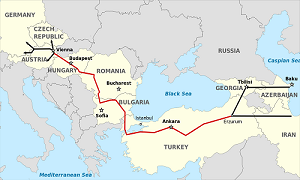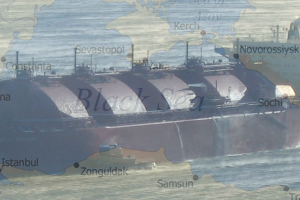Russian Gas in the Southern Gas Corridor Could Undermine the EU’s Diversification Plans
By Ilgar Gurbanov
March 27, 2017, the CACI Analyst
Gazprom has officially declared its willingness to use the Trans-Adriatic Pipeline (TAP) as a route to deliver gas to Europe. TAP is an integral part of the Southern Gas Corridor (SGC) which is one of the priority energy projects for the EU to ensure the continent’s security of supply from a non-Russian source. Although technical and legal possibilities exist for Gazprom’s use of TAP’s expanded capacity, the long-term contracts securing the pipeline’s initial capacity for Azerbaijani gas together with EU legislation makes this option less likely. Nevertheless, the possibility of a Russian bid for TAP could hamper the EU’s diversification plans and block future gas supplies from other non-Shah-Deniz sources.

The "Four-Day War": new momentum for Nagorno-Karabakh resolution?
By Zaur Shiriyev
May 2nd, 2016, The CACI Analyst
In early April, the escalation of hostilities between Armenia and Azerbaijan resulted in a so-called “four-day war”, which was ended by a truce reached under Russia’s auspices. The expectation was that after the end of this short war, international engagement would increase, with the re-energizing of the Minsk Group. But so far, Moscow is the only active party. The Russian Foreign Minister, Sergey Lavrov, is conducting “shuttle diplomacy” between Yerevan and Baku, the results of which will become clear in the coming weeks.
EU's Southern Gas Corridor still lacks strategic approach
By Najia Badykova
March 30th, 2016, The CACI Analyst
On February 29, 2016, the Southern Gas Corridor Advisory Council met in Baku for the second time and asserted that the diversification of EU energy sources remains a key component of the Union’s energy security policy. But the project faces serious hurdles. After many years of discussions with potential gas suppliers, Brussels has only been able to secure 10 billion cubic meters (bcm) of Azerbaijani gas per year for the corridor, a tiny fraction of EU members’ needs. Without securing significantly larger new gas supplies, it will be difficult economically and politically to justify such a large and expensive infrastructure project. While EU officials continue to assert their commitment to the corridor, it is unclear whether Brussels is moving toward the pragmatic approach necessary to secure more gas for the scheme or if we are only witnessing further rhetoric from bureaucrats.
Turkmenistan advances westward natural gas export
By Natalia Konarzewska
March 25th, 2016, The CACI Analyst
In late December 2015, Turkmenistan officially announced the completion of the East-West gas pipeline. This 773 kilometer route with an annual capacity of 30 billion cubic meters (bcm) will connect natural gas from fields located in eastern Turkmenistan to those along its Caspian Sea coast, with the potential of further transfer via the Caspian Sea and onward to the Turkish and European markets. The construction of the pipeline is complementary to Turkmenistan’s current strategy for gas exports. Ashgabat seeks broader export opportunities in Turkey and Europe to reduce its dependence on Russia and China as major gas export outlets. However, despite positive political shifts, which might enhance Turkmenistan’s energy cooperation with Turkey, Azerbaijan and the EU, several obstacles remain to the westward transfer of Turkmenistan’s gas.
AGRI's progress advances Brussels' and Baku's energy agendas
By Micha’el Tanchum (08/07/2015 issue of the CACI Analyst)
On June 24, 2015, Azerbaijan, Georgia and Romania signed a declaration committing to advance the Azerbaijan-Georgia-Romania Interconnector (AGRI) project that will transport Azerbaijani LNG across the Black Sea to Romania for re-gasification and sale in European markets. The project creates a theoretical possibility for Turkmen LNG to reach Europe through a modified use of the system. Of great geopolitical consequence, the option requires a commensurate amount of political will to implement. Independent of potential Turkmen gas exports, the furtherance of the AGRI project constitutes an important advance for Azerbaijan’s strategic policy to develop European Union stakeholders in its political sovereignty.








